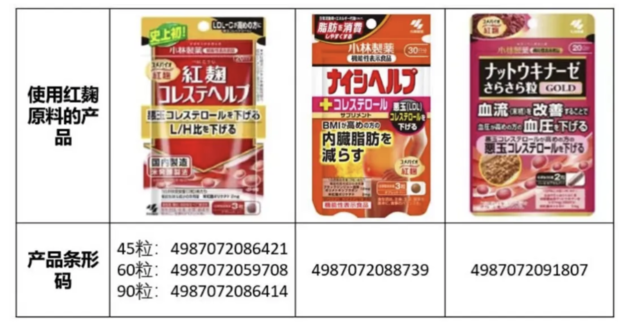
Photo/three red yeast rice dietary supplements recalled
The ongoing health crisis related to Japanese pharmaceutical company Kobayashi Pharmaceutical continues to escalate. On March 30, the health ministry and local authorities on Saturday inspected one of its factories.
Kobayashi Pharmaceutical has so far reported a total of five deaths and the hospitalizations of more than 114 people as possibly linked to the red yeast rice dietary supplements.
The drugmaker as well as Japan's health ministry said the company's examination unexpectedly found puberulic acid, a natural compound made from blue mold, in the products. The ministry said the substance is a potent antibacterial and antimalarial agent that can be toxic. However, it remains unclear how this highly toxic substance found its way into the products and what impact it has on the kidneys.
Kobayashi Pharmaceutical previously announced a voucher of 2,500 yen (around 16 U.S. dollars) will be provided per item as compensation. There will be no differentiation in compensation for consumers both from home and abroad once the causal relationship is established.
The factory in western Japan, which was making the ingredients of the supplements, shut down in December, and the equipment has since been transferred to Wakayama Prefecture.
The affected health products were primarily produced between April and October 2023, with market availability from July to December 2023. Currently, 173 companies that used Kobayashi Pharmaceutical’s red yeast rice raw material for production are conducting voluntary self-inspections. Out of the 18.5 tons of beni-koji raw material manufactured by Kobayashi Pharmaceutical in 2023, approximately 16.1 tons were sold to external parties.
Additionally, due to the export of red yeast rice raw material, Japanese authorities notified the World Health Organization (WHO) on March 28. The impact of this crisis extends beyond Japan, potentially affecting the global perception of Japanese health products.
Kobayashi Pharmaceutical, a century-old company, heavily relies on health products in its domestic business, accounting for over 50% of its sales. In its 2023 financial report, the company expressed plans to strengthen this category’s overseas development, aiming to increase the share of health product sales in overseas markets from 20% in 2023 to 35% by the end of 2030.
Dr. Wang Yong, initiator and chairman of the China Brand Festival and director of the Brand Alliance, expressed in an interview with the National Business Daily that the impact of the recall on Kobayashi Pharmaceutical is evident. First, sales of affected health products are expected to plummet. Second, the company must allocate substantial funds for product recalls, compensating victims, and improving production processes. Additionally, legal litigation arising from the incident may further strain the company.
From a brand image perspective, this event poses a severe blow to Kobayashi Pharmaceutical. Once a trust crisis takes root, repairing it within a short timeframe becomes challenging. Notably, several Japanese health supplement brands, represented by Kobayashi, have intensified brand promotion and marketing in China in recent years. They have launched numerous popular products, some even earning the moniker “Japanese miracle drugs.” Consequently, this recall incident could erode consumer trust in all Japanese health supplements, potentially impacting long-term sales in the Chinese market.
As the controversy continues to unfold, industry insiders speculate that Kobayashi Pharmaceutical may exit the nutritional supplement and health product market. Institutions, including SMBC Nikko Securities, estimate the recall cost at 1.8 billion Japanese yen (approximately 11.9 million US dollars), with the possibility of further escalation. This projected cost could lead to a 6% decline in the company’s expected net income for the current fiscal year. As a result, Kobayashi Pharmaceutical’s stock price has cumulatively dropped by 15.87% this week.
However, analysts from Morgan Stanley, led by the Wako Sato team, suggest that while the recall is negative news, its impact on Kobayashi Pharmaceutical’s stock price may be transient. They believe that despite the recall’s significant scale, its effects on other Kobayashi products remain limited within a defined range.
Nevertheless, Nikkei News reports that Kobayashi Pharmaceutical has already ceased television advertising and other promotional activities as part of its core marketing strategy. When a company’s image falters, the efficacy of advertisements weakens, and consumers may choose to disengage. The current situation indicates an increasing risk of spillover effects on other goods. If these effects become pronounced, they could undermine the company’s operational foundation.


 川公网安备 51019002001991号
川公网安备 51019002001991号





